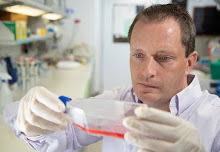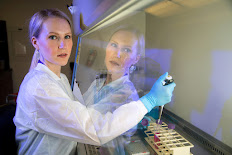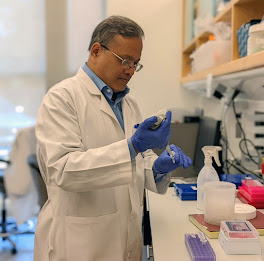Debanjan Chakroborty, Ph.D., assistant professor of pathology; Seema Singh, Ph.D., professor of pathology; and Luis del Pozo-Yauner, M.D., Ph.D., assistant professor of pathology, will examine different aspects of breast cancer, the most common cancer and the second leading cause of cancer-related deaths in women in the United States.
The highly competitive grants provide each researcher $50,000 in funding per year for two years. The awards function as seed funding for early-stage studies, allowing researchers to generate the additional data needed to attract major national funding.
The goal of Chakroborty’s proposed research is to establish a molecular link between hypertension and breast cancer progression. Studies suggest that women with high blood pressure have an increased risk of developing breast cancer in their lifetime compared to women who have normal blood pressure. Furthermore, hypertension is often observed in patients with advanced breast cancer.
However, the molecular connection between hypertension and breast cancer is not clearly understood, Chakroborty said. Specifically, his research aims to identify the role of a protein-coding gene known as WNK1 (WNK Lysine Deficient Protein Kinase 1) in progression of the disease.
“Our preliminary studies have identified that WNK1, which is a master regulator of hypertension, is overexpressed in a subset of patients with breast cancer and is associated with worse prognosis,” Chakroborty said.
The study will be conducted in collaboration with Singh, fellow BCRFA grant recipient, and Elba A. Turbat-Herrera, M.D., professor of pathology at the Whiddon College of Medicine and director of the biobank at the USA Health Mitchell Cancer Institute.
Singh, who is also a senior member of the cancer biology program at the Mitchell Cancer Institute, will examine how exposure to stress shapes the tumor immune microenvironment. “It is believed that the immune cell composition within the tumor plays a key role in defining the therapeutic responses while also supporting aggressive tumor growth,” she said. “Further, in our ongoing research, we have found that African American women are exposed to more psychosocial and economic stressors, creating a hormonal imbalance that weakens their immune system and supports breast tumor cell growth.”
Breast cancer disproportionately affects Black women, who experience earlier onset and more aggressive disease diagnoses leading to higher mortality rates than their white counterparts. The study will include breast tumor samples of different molecular subtypes from Black women and white women, which will provide researchers with information on whether race acts as a modifying factor in shaping the immune tumor microenvironment and if immune cell composition varies among different subtypes.
“The resulting data will enhance our understanding of breast cancer immune landscape diversity and its association with stress exposure in the cancer patient,” she said.
Singh’s long-term collaborators include Ajay Singh, Ph.D., professor of pathology and leader of the cancer biology program at the Mitchell Cancer Institute; and Elliot Carter, M.D., professor of pathology. Her lab team includes postdoctoral researchers Amod Sharma, Ph.D., and Sarabjeet Kour Sudan, Ph.D.
Del Pozo-Yauner’s research will focus on triple-negative breast cancer (TNBC), an aggressive subtype characterized by a high tendency to grow and metastasize faster and to develop resistance to anti-cancer therapy. TNBC disproportionately affects Black women and contributes to the disparities in breast cancer mortality.
The study will look at polyploid giant cancer cells that overexpress a protein known as PERK. Polyploid giant cancer cells are a common finding in human cancers, particularly high-grade and post-treatment cancers, as well as in metastases. The PERK protein regulates an important mechanism that cells use to protect themselves from conditions that cause cellular stress, such as chronic inflammation, hyperthermia and treatment with antitumor agents.
“Interestingly, overexpression of PERK protein has been reported to promote chemotherapy resistance in breast cancer,” Del Pozo-Yauner said. “Considering our preliminary data, as well as findings from other laboratories, we postulate that the subset of polyploid giant cancer cells that overexpress the PERK protein is associated with a poor response to chemotherapy in African American women with breast cancer, particularly those with triple-negative subtype.”
The research team includes Turbat-Herrera; Veronica Ramirez Alcantara, Ph.D., manager of the USA Health Biobank; and Madhuri Mulekar, Ph.D., professor and chair of mathematics and statistics at the University of South Alabama.
The grant recipients expressed their gratitude to Guillermo A. Herrera, M.D., professor and chair of pathology; and Ajay Singh, Ph.D., director of research for pathology; and Martin Heslin, M.D., M.S.H.A., director of the Mitchell Cancer Institute, for their support.
BCRFA is a nonprofit organization whose mission is to find a cure for breast cancer by funding promising breast cancer research in Alabama. BCRFA funds promote a comprehensive approach to battling breast cancer by fueling collaborative and innovative research to help diagnose, treat, prevent and eradicate the disease.




































.jpg)




